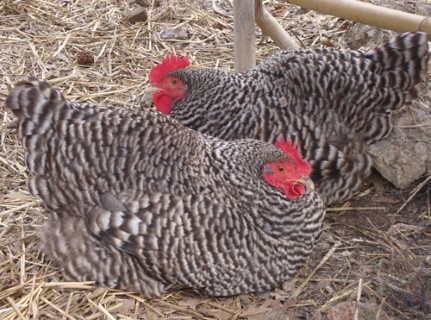Dominique
Chickens are dual purpose birds. They excel in egg production and lay a steady
three, large, brown eggs a week long into the winter months. Hardy survivors,
the Dominique can survive a cold winter or a hot, humid summer. Dominiques
mature quickly. A medium size fowl dresses out as an acceptable three-pound
table bird.
Dominiques chickens
grew up with America. In colonial days the Dominique fended for themselves as
foragers of seeds, insects, and plants. Colonial America valued the Dominique's
feathers as fill for their pillows and mattresses.
Broody Dominique
hens make good mothers and pets. The hens have exceptional success and low
mortality rates raising their brood. The hens have a calm, friendly demeanor. However,
Dominique roosters are contentious and a worthy opponents to predators. Owners
have seen roosters kill snakes and minks. Dominiques handle both confinement
and free-range foraging equally well. Dominiques exhibit an incredible
adaptability to their given environment.
Dominique are
described as hawk-colored in reference to their plumage patterning. They
display black barring over their entire white bodies. They sport medium red
combs, wattles, and earlobes on a medium frame. Many confuse the Dominque with
the Barred Rock breed. Experts can tell the difference immediately as the
Dominque has a red rose comb; whereas, the Barred Rock has a red single comb.
Males have a “U” shaped back with an upright tail. Female backs follow a more
natural outline sloping down from head to tail.
Cater to your
Dominique's foraging instincts. Provide them adequate runs with ample bugs,
seed and pebbles. Of course, a little attention and a good layer food will pay
rich dividends in egg and meat production. Keep the number of Dominique
roosters to a minimum. However, you may want to keep a sufficient number around
to ward off predators and to propogate this endangered species.

